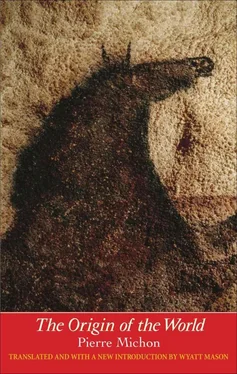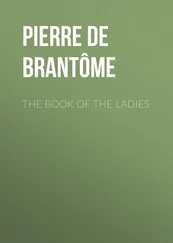Pierre Michon - The Origin of the World
Здесь есть возможность читать онлайн «Pierre Michon - The Origin of the World» весь текст электронной книги совершенно бесплатно (целиком полную версию без сокращений). В некоторых случаях можно слушать аудио, скачать через торрент в формате fb2 и присутствует краткое содержание. Год выпуска: 2013, Издательство: Yale University Press, Жанр: Современная проза, на английском языке. Описание произведения, (предисловие) а так же отзывы посетителей доступны на портале библиотеки ЛибКат.
- Название:The Origin of the World
- Автор:
- Издательство:Yale University Press
- Жанр:
- Год:2013
- ISBN:нет данных
- Рейтинг книги:3 / 5. Голосов: 1
-
Избранное:Добавить в избранное
- Отзывы:
-
Ваша оценка:
- 60
- 1
- 2
- 3
- 4
- 5
The Origin of the World: краткое содержание, описание и аннотация
Предлагаем к чтению аннотацию, описание, краткое содержание или предисловие (зависит от того, что написал сам автор книги «The Origin of the World»). Если вы не нашли необходимую информацию о книге — напишите в комментариях, мы постараемся отыскать её.
The Origin of the World — читать онлайн бесплатно полную книгу (весь текст) целиком
Ниже представлен текст книги, разбитый по страницам. Система сохранения места последней прочитанной страницы, позволяет с удобством читать онлайн бесплатно книгу «The Origin of the World», без необходимости каждый раз заново искать на чём Вы остановились. Поставьте закладку, и сможете в любой момент перейти на страницу, на которой закончили чтение.
Интервал:
Закладка:
It was extraordinary. It was bare. It was the cupola of Lascaux at the very moment when the old bachelors had entered it, antlers on their heads, and in the torchlight their hearts had leapt in their chests; when the impeccable expanse of white limestone had been unveiled for them alone, creamy, smooth, lightly grained but a grain that all the same they skimmed over with the tips of their fingers, this grainy, milky world, this mondmilch , overflowing with candor, this great drapery, served to them as if on an easel between a fringe of dark quartzite and a bulbous ceiling, heavy and secret. The trickster who leads you into the black doesn’t always deceive, the universal miasma has its good points, between two gullies, two joints in the rock where they break the bones. There were no paintings. It was Lascaux at the instant when the crouching bachelors wedded their idea, conceived it, breaking the ochre sticks and stirring the wood coals in a puddle, silently, settling the antlered hats next to them; and perhaps they then picked them up and turned them in their hands, their hats, they looked at them sweetly and thought of their earliest childhoods, thought seriously that one day they would have to die, that they loved women and eating, fooling around with antlers on their heads; the clement and insatiable gods looked at them in that moment, breathed through their mouths, felt their joy, and soon threw them to the walls with that joy, standing, uncertain of will but sure of hand, tracing huge red cows more wounded than women but who leaped like them, joyous, hunted. The old bachelors weren’t even there, just Jeanjean. He had stopped inside, perfectly visible under the floodlights. He wasn’t saying anything, pleased with himself, standing in the heart of this daughter of the floods, vibrant against its immutable whiteness. My desire was situated just so, in Yvonne. In the lamplight, his dull, coarse hair shone brightly; his big greenish wool sweater, glowing as well, hung heavily on his sloping shoulders, his low hands. With one great, slow, somewhat theatrical gesture, his hand rising above him, he embraced the space: “As you can see,” he said, “there’s nothing here.” Despite his smile he was perfectly serious, a bit stiff, and his drunken eyes roamed the walls, avidly, tenderly. Mado, who was leaning on the limestone, gathered her duffel coat close around her, curling into it, watched with her mouth open, dumbfounded. Overcome with his customary enthusiasm, he turned his back on us suddenly and walked to the rear of the gallery, where it opened up into another that sloped downward; he added, as if for himself: “Absolutely nothing.” He was already into the next gallery. Mado was giggling.
In the other rooms, diverticula and shafts, illuminated too but not as brightly, there were no human traces: only a few scratches from bears, the whitest marks in the limestone, and, in little low displays carefully arranged that no doubt served as a warning and justified the sign from the tourist bureau, a fair number of fossil bones, metatarsi or vertebrae, which Jeanjean told us were from bears, from foxes and wolves, one of these crepuscular runaways that our ancestors were in the habit of depicting alone in the background, and which the prehistorians call the third animal because he turns his back upon these massive, redundant dances, where bison and horses entwine in pairs, mammoth and oxen. Jeanjean was still joyous, benevolent; he told us how he had discovered these bones; Mado laughed openly, not because she was making fun of him, but because this solemnity, these little lights lit for nothing beneath the earth, the excited explanations by our guide and the time we were wasting flabbergasted her, like a practical joke that she was taking well: a little later in the car she would tell me that Jeanjean was full of hot air. But she was tickled too, she was seduced. He had looked at her and spoken to her more than to me, almost with complicity. Past the displays ran a stream that pooled into a vast, handsome green pond; it flowed into the Beune. Jeanjean explained that when he had cleared this part, he had found pure white carps in the pools, white and blind, albino fish spawning for millennia in the black, eyes wide open and white; the electricity had killed them. Mado was dreaming, her eyes on the pond. We reached the expected culde-sac and some impassable passageways leading from it, that was all. Jeanjean came back, silent, Mado was dragging. He crossed the white bubble like an arrow; then the narrows, the entryways, and at last the last bottleneck, between the John Deere and the wall. It was raining less. The gray rising sky seemed larger; a hirsute pony ruminated all alone in a field like a little Tartar horse abandoned in the Wallachian landscape; he was trembling. The poor animal pissed, solitary as winter. I saw a steeple between some fir trees, less than a mile away. It was the church in Castelnau. I was shocked; Jeanjean told me that essentially we were right around the corner, that we shouldn’t trust the road whose detour distorts distance, that there were a thousand ways through the woods that would take you to Chez-Quéret in under an hour. These geographical caprices seemed to amuse him. He looked toward Castelnau. He was jubilant.
Six
I have a difficultconfession to make: I martyred Bernard. He was a charming child, guileless, wise. His mother — who had him from a failed marriage and had left her acolyte behind, or perhaps the other way around — I believe his mother adored him. She had limitless love for this supernumerary flesh, but as I said, this didn’t do him much good. I would see her waiting for him at the gate to the school, perched on her high heels, vigilant, unaffected, surrounded by all the gossips, taller than them all, speaking to them, vivacious, infatuated with nothing, putting a little hat on the boy or holding his shoulder while she talked, then moving off while taking his hand, but what I remember best is of course her smooth hands in the wool hat, her chapped, outlined lips that made her lisp as she cuddled him; I have a disproportionate memory of her departure, her stockinged legs and her hips moving the length of the road where supernumerarily trotted alongside her the well-behaved legs that I can’t quite recall. He reached out his arms and took her cheeks in his hands, the enormous earrings, when she bent down to kiss him; the raven hair caressed the child’s face, the comb slowly slipping through the mass before tumbling free; and when he walked alongside her, his little schoolbag in one hand, he had his other hand in between the backs of her knees, crumpling and pulling on her skirt, brushing her stockings. In the end, I adored Bernard too. He didn’t talk very much, he was curiously reserved for his age: not placid and even less dull, but intensely reflective, as if poised in mid-leap, watching adults with a serious attention that hadn’t anything to do with politeness. He looked at you deeply from out of his round eyes, doubtless trying to understand, but the great seriousness and the depth of his zeal gave you the impression that he had understood things before you had, knew what you would do and even forgave you for it. But this was only my impression. Perhaps he had actually understood it all, because there wasn’t very much to understand: his Christmas came every day, universal contact with this unplumbable richness, the queenly bearing and the hooker’s heels, this piece always bent over him and long since fallen from the sky, these hands that embodied pleasure as the fingertips removed his swaddling clothes, later readying his book bag, his bread and butter, infusing in him a sort of wordless understanding, dolorous and ecstatic, and so he didn’t need to play very much, to exert himself, he could remain there in his little armchair and look on with something like terror as the milk and honey flowed, fixing the memory of this outpouring all for him. And he knew in some way that the source of the milk and honey wasn’t meant for him. He certainly knew this liftable skirt, although it ceased at a certain point even for him, at boundaries both definite and vague somewhere above her stockings, where the great gift became a torture one could neither give nor be given; he knew the outside of this gift, this refusal, this wardrobe as familiar to him as the buffet in which was cocoa and cups to have it in, no more a secret to him than were the contents of Jean the Fisherman’s shoulder bag; he knew the preparations, the feverish comings and goings in lingerie in front of mirrors, heels clattering, and seated in his little armchair he watched, with his serious stare. He knew her Sunday best. He watched her tremble beneath it; and he could doubtless foresee, with the old look of his new eyes, the burning, the fever that threw her into the night, her raincoat on her shoulders, the night at the heart of which Jeanjean waited, leaning against his nothing, his limestone Nobody behind the harvester, leaning steadfast, waiting, suddenly springing through the struts beneath the blade of moon, he had in his hands the white mask, the night hair, he calmly opened the raincoat and calmly handled her, held her, stripped her to all that milk, her heels twisting and her smooth hands grazing the wall as he took her in a barn. And Bernard, lifting an ear from his little armchair, heard the growling of dogs, he didn’t hear the cries of pleasure. But he saw their marks, the chapped lips and the anguished eyes, the dusty heels, and occasionally the more indelible mark, the black honey, the cassis swollen in orgeat, when she came home in the middle of the night with her wet cheeks, when she opened the door to his room a crack, he pretended to wake up, or waking up for real asked her, among silks undone on the ground beneath her feet, what was it, the black honey, and she, telling him that it was nothing, nothing at all, she leaned her face toward him and kissed him full on the lips, crying or laughing. And he went to sleep next to her, clutching this beautiful, victimized body, just as Jeanjean had but in a different way than Jeanjean had, although with no less love, for love varies. He went to sleep and beneath the knife of the moon roosters sang before the fall into the black hole, and a little fox ran through it that he didn’t hear because foxes yelp only in dreams. So all that belonged to Bernard, I could see it in his eyes and I know I wasn’t wrong. And because of that I would give him bad grades when I felt like it, I had sway over the proceedings, tangentially. The heart of the annoyance, the dolorous debate taking place in my character, was mildly appeased. And without question I was waiting above all for Yvonne to ask me about these injustices, for her to come to see me. But she wasn’t one of these mothers who bothers with such conventions, who believes that the future of each of us differs according to our scores on a quiz; her love for Bernard was of a much older variety, she didn’t even need to look at my pedantic little marks in red ink, she was from the age of the old bachelors as well: she never came.
Читать дальшеИнтервал:
Закладка:
Похожие книги на «The Origin of the World»
Представляем Вашему вниманию похожие книги на «The Origin of the World» списком для выбора. Мы отобрали схожую по названию и смыслу литературу в надежде предоставить читателям больше вариантов отыскать новые, интересные, ещё непрочитанные произведения.
Обсуждение, отзывы о книге «The Origin of the World» и просто собственные мнения читателей. Оставьте ваши комментарии, напишите, что Вы думаете о произведении, его смысле или главных героях. Укажите что конкретно понравилось, а что нет, и почему Вы так считаете.












